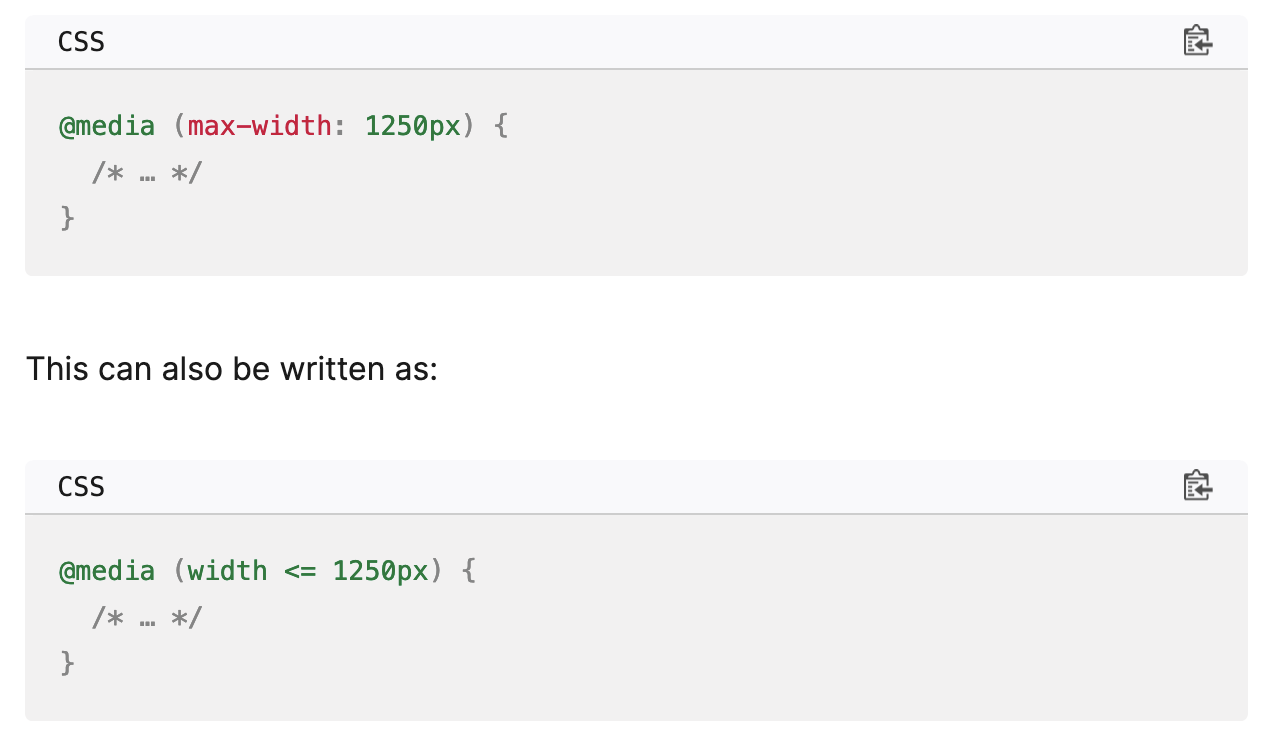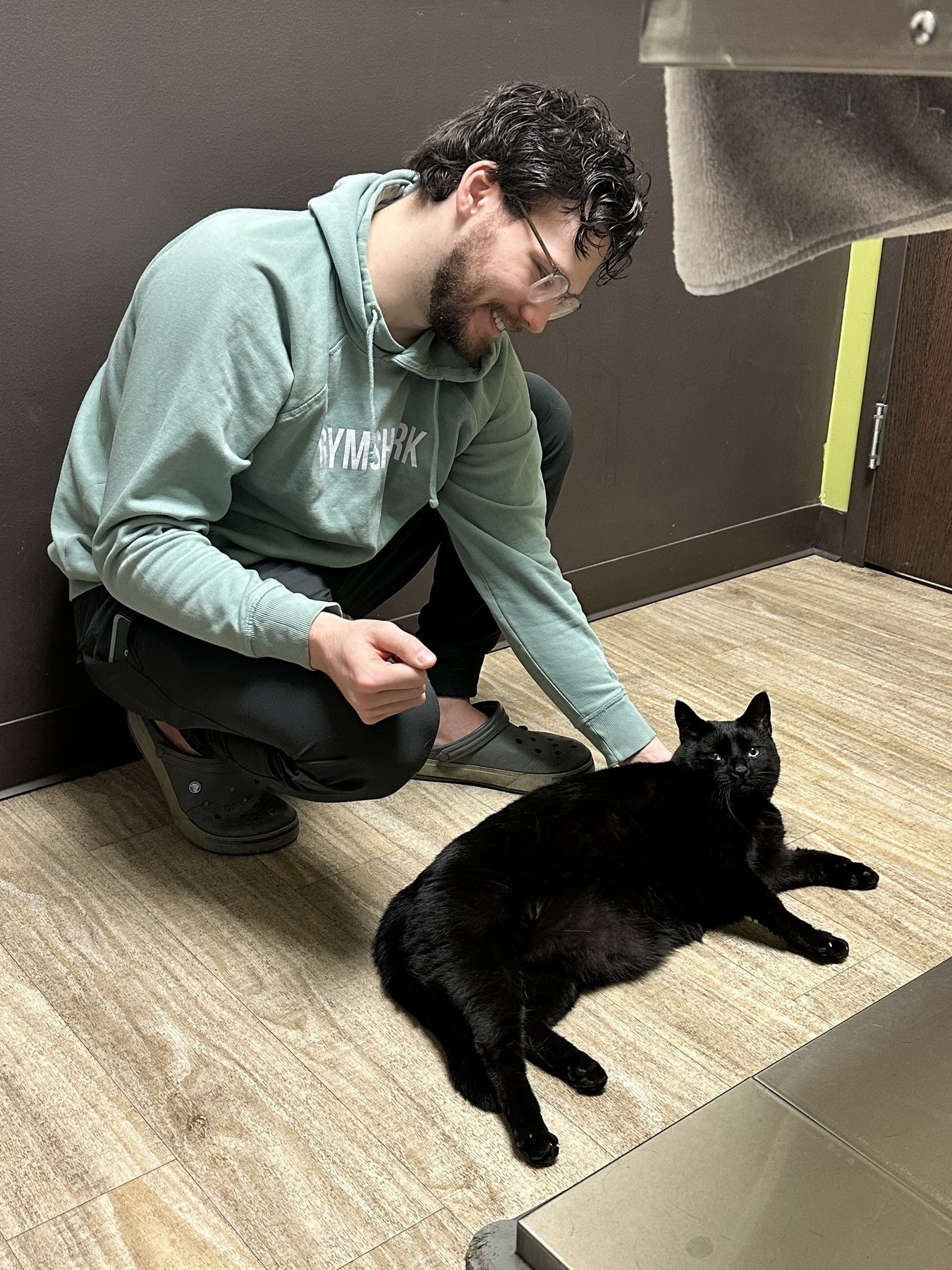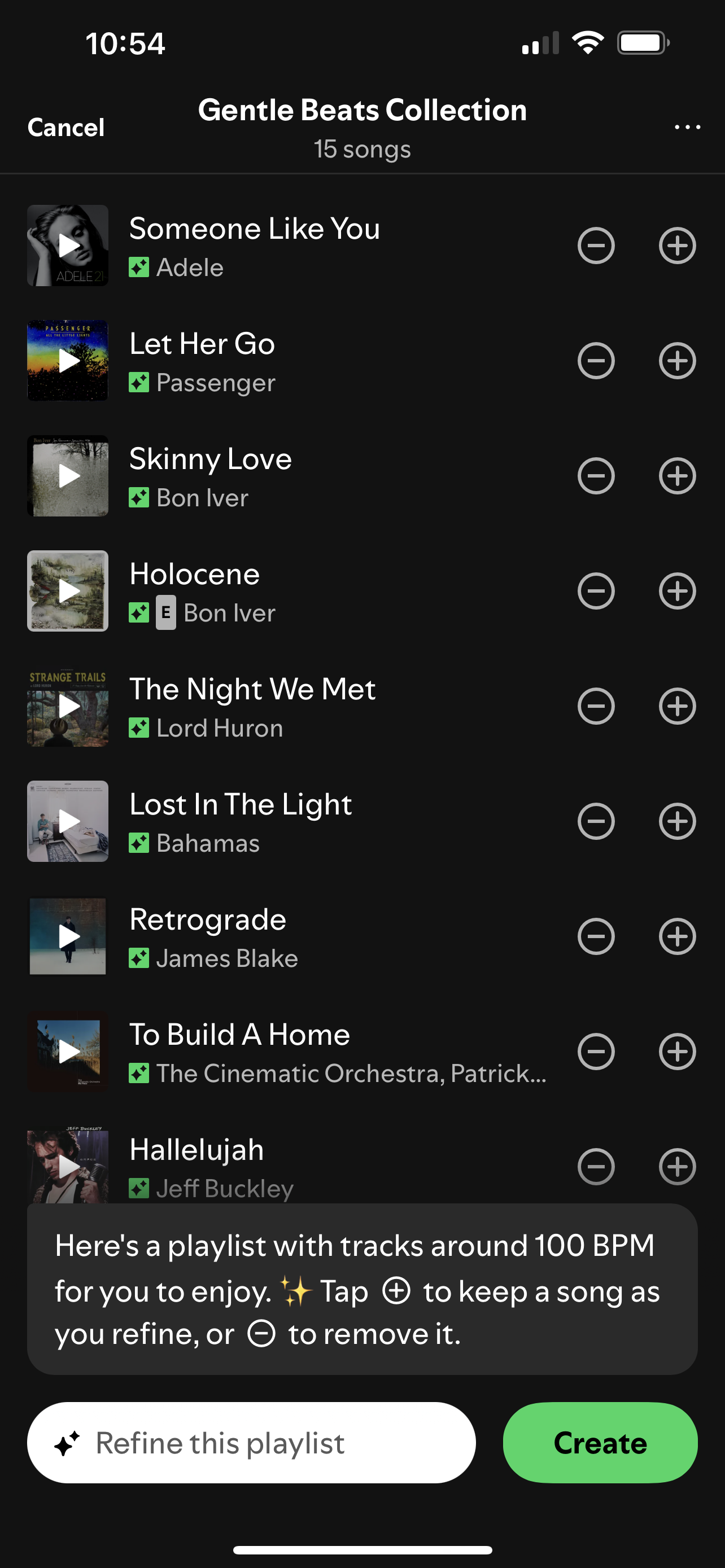Nobody Can Read and We Don’t Trust Anyone
130 million American adults have low literacy skills. A shocking number of Americans don’t know the three branches of government. Even fewer can name all their First Amendment rights. Even smart people misinterpret facts and believe misinformation. So what do we do?
We live in an overwhelming, exhausting world where everything seems to contradict each other. One day, coffee is killing you. The next, it’s a miracle cure.
We’re told to “do your own research” while algorithms inundate us with fake news and fake experts.
And sometimes the most unbelievable things turn out to actually be true.
This constant uncertainty erodes our faith in everything—science, government, even our own perception of the world.
So how do we navigate this endless black hole of information? How do we reclaim our sanity and trust again?
Read on to discover how we can:
- Understand the limitations of ‘doing your own research’
- Improve our critical thinking skills
- Identify credible sources
- Decide whether something is worth researching
- Understanding why people lack trust in institutions
- Learn how to rebuild trust in institutions (and ourselves)
The Real Literacy Rate
In school, I was told everyone finishes high school and we are a universally literate society. Neither of these things are true.
The high school graduation rate is 87% for 2021–2022. To be fair, this is actually 7% higher than the previous decade.. But quite a bit a way from 99.99% that I was told.
And 130 million American adults have low literacy skills. You can see an interactive literacy rate map here.
Now you may be thinking this is clickbait, but let’s look at what literacy level means.
- Level 1: Locate a single piece of info in a short, simple text.
- Find the expiration date on a milk carton.
- Level 2: Identify a main idea in a text with some distracting info, make simple inferences.
- Read instructions for assembling a piece of furniture.
- Level 3: Understand dense text, synthesize info from different parts, and apply it.
- Read a news article about a political issue and summarize viewpoints presented.
- Level 4: Integrate info from complex and lengthy texts, understand nuance, make high-level inferences.
- Analyze a research paper and evaluate evidence presented.
- Level 5: Understand and evaluate very complex tests, synthesize info from diverse sources, and construct detailed arguments.
- Write a persuasive essay on a controversial topic, citing evidence from multiple sources.
54% of Americans are at level 2 literacy level or lower. That’s a lot of people who can’t summarize multiple viewpoints and understand dense text. These are crucial skills for doing your own research.
And while following instructions verbatim can be valuable in life, it certainly does not help you critically think. How can you if you can’t summarize a variety of perspectives within a single article?
Not Your Dad’s Research
Here are some things people call doing “their own research”, which absolutely does not count:
| Not Research | Research |
|---|---|
| Anecdotal Experience “I feel cold, so global warming is impossible” |
Facts “Global temperatures are rising year-over-year.” (source) |
| Listening to someone who sounds authoritative | Finding a real expert |
| Citing a single “research” study | Pointing to concrete data, multiple research studies by reputable scientists, and surveys that follow good methodology |
| Cherry-picking data “I found this single fact to prove my point” |
Look for contrary evidence “Here’s multiple studies” |
| Reading headlines “Crime is rising!” |
Read full articles “Despite claims of crime rising, it has actually been steadily declining” |
| Believing personality over truth “He said it, so I assumed it was true” |
Double-check suspicious claims and people who have been known to lie or exaggerate |
| Quoting old information “I learned airplanes were unsafe in high school in the 1950s” |
Update your knowledge “Ah, it turns out that airplane travel is the most safe form of travel” |
| Ascribing supernatural explanations to known phenomena “My horoscope is so true!” |
Consider whether something is a generalization and look for alternative explanations |
| Common sense “It makes sense to me!” |
Realize many things are not intuitive and require additional research |
| Never following up on previous research “I made this decision or trusted this person because I was promised something.” |
Recheck later. If you don’t validate you were correct, you didn’t research. You just looked at something once uncritically. “Was I wrong? Did this person keep their promises? Did this info change? |
Clickbait
Half the time, something stumbles across our feeds and we take it at face value. We get triggered emotionally by an enraging hook. We conflate confidence with expertise. JA Westenberg has an amazing article about the death of expertise and how we give into this.
“At some point, we collectively decided that scientists, doctors, and other professionals — people who dedicate their entire lives to understanding complex issues — are just… boring. Their years of rigorous study, clinical trials, and peer-reviewed findings can’t compete with the glitz and glamour of someone famous for pretending to be a lawyer on a prime-time drama.” — JA Westenberg
Then, there’s the stuff you chose to spend your time researching. It’s bad enough we don’t look to experts and we often can’t understand stuff when we come across it, it’s worse when we spend time on stuff that’s not worth looking into at all
It’s like meticulously researching the history of spoons when you’re trying to learn how to cook a gourmet meal. It’s just not that relevant to your life or goals.
We have people spending their lives dedicated to wasting time on researching nonsense and attempting to disprove well-established facts. Yet even when we focus on worthwhile topics, there’s simply too much information out there for any one person to grasp it all.
So we can’t be well-informed on every topic. No person can possibly research everything. So it’s crucial we identify things that are both worth researching and relevant to our own lives.
Knowledge Gaps
Consider the grocery store. It’s a pretty complex place behind-the-scenes. Just to get a banana to your local store is a massive logistics nightmare, and that’s just one item. We take the grocery store for granted and we assume we understand it. Do we need to understand everything about how a grocery store works to shop at one? No. And few people know all the inner workings of pretty much anything in the world. Even “intelligent” people usually know far less than they imagine.
It’s like if someone asks you to draw a picture of a working bicycle from memory and you realize you are a goddamn idiot. I drew a bike that didn’t even have a chain on it.
Blind Spots
We all have blind spots. To overcome them effectively, we need to be taught:
- basic logic, like fallacies (not common sense)
- better reading comprehension skills
- how to determine what is worth researching
- how to find credible sources
- what to do with a credible source
- how to update your knowledge
- to make more trustworthy institutions worthy of public trust
I won’t break these all down here, but if you want to learn more about logical fallacies, check out this article from Farnam Street.
Is it worth the squeeze?
As mentioned above, it isn’t worth spending your life researching obvious conspiracy theories that have been disproven centuries ago. So when is the juice worth the squeeze?
Your time is usually better spent elsewhere than trying to prove the experts wrong. Unless it’s something that directly impacts your life or you are an expert in that area.
Critical thinking means knowing when to conserve your energy. Focus your investigative efforts on topics where it is relevant to your life or understanding of the world, where the stakes are high, or that lead to permanent results.
You don’t need to have an opinion on every news piece or potential moral quandary. But you likely should be taking time to research high-stakes life changing decisions like 401ks or buying a home. These are processes you need to understand to not get scammed and get the best deal possible. These are also decisions you often can’t take back easily.
If you’re going to make something the center of your identity, it probably makes sense to do a bit more research into it. Or better yet, don’t tie things so strictly to your perception of yourself to begin with.
So once we establish something is worth looking into, how do we find credible information?
If you’ve never read the about page or considered the author of a piece, you have never done real research. We need to consider the bias of the news source and the author of a piece. If a site doesn’t even bother having an About Us page, that can be a major red flag. You can go deeper. If you decide to use a specific news source for every single thing, it’s worth finding out who funds them, because that often sets their priorities and bias.
People think finding unbiased news is important, but this is not the case. Everything is biased. We are trying to understand what perspective the news source is coming from and why. For example, an article from Associated Press typically focuses on facts and is less loaded emotionally because it is intended to be reused by other media outlets directly.
There are websites that try to do this legwork for you like Media Bias Fact Check , AllSides, or AdFontes (shoutout to Vanessa Otero who is the Founder/CEO of AdFontes and a dope person I’ve chatted to a few times!) . There are also several news aggregators that attempt to label whether a piece of news is left, center, or right. These tend to be a bit gimmicky to me, but I do like when they show the stories that are not being covered by one side or the other. Ground News has a feature called Blindspot which does this:
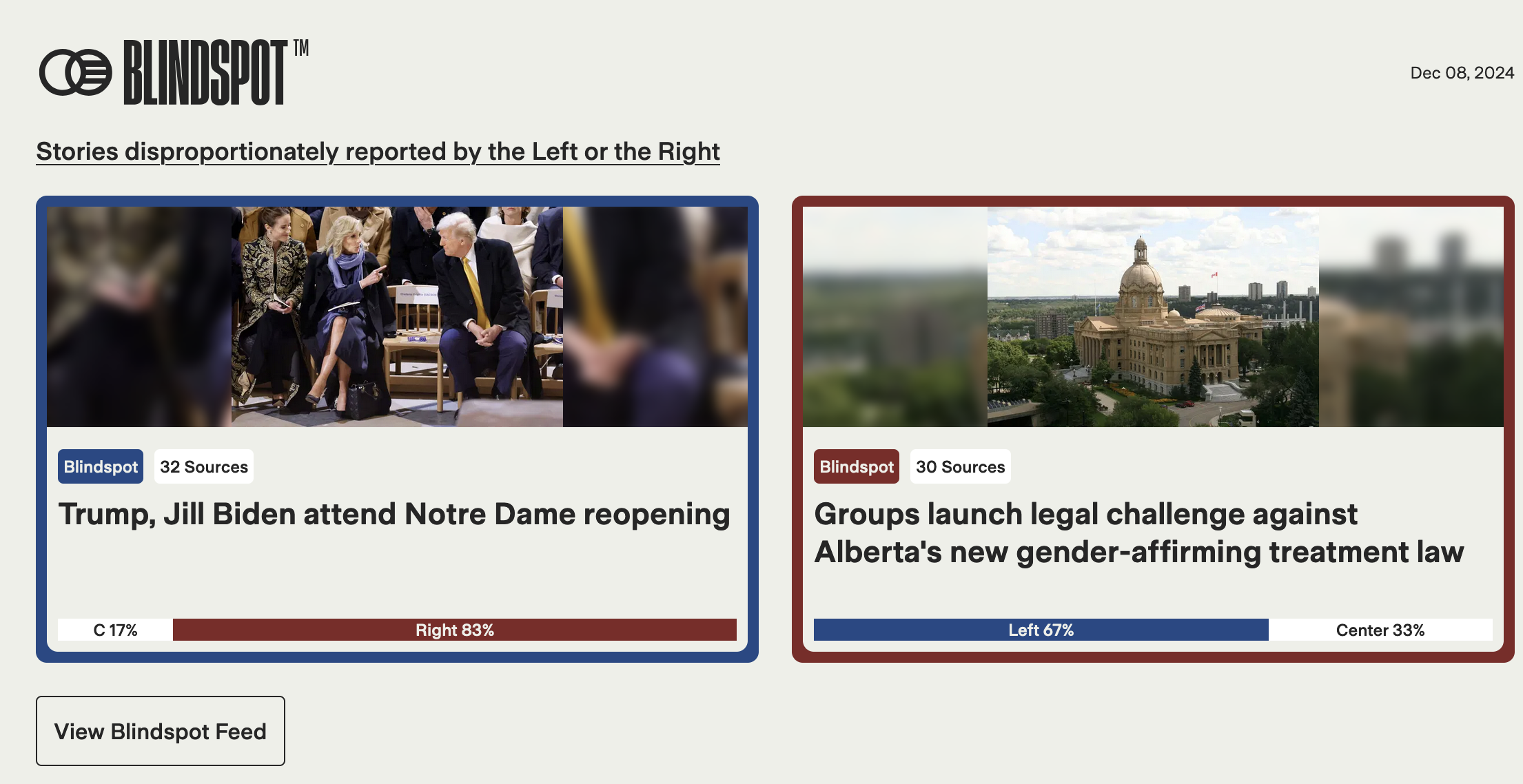
But there are far more biases than simply generic political “left” or “right”. A study funded by Hershey is more likely to find chocolate to be amazing and show it in a good light. But even “positive” causes can be significantly biased. People often try to do “good” in the world at the expense of facts, reality, or integrity.
It’s the classic line: don’t trust the salesman.
I tend to prefer pro-science sources where possible, because they tend to leave out clickbait-y headlines and tend to cite sources well.
But science has been wrong!
I’m not a scientist, but sometimes our current understanding of science is wrong. That doesn’t make science itself wrong. Science updates when we learn new shit. That’s actually the definition of science.
But humans are humans and they run human institutions that can corrupt shit.
You don’t have to look far to see this:
Famous theories that define our current understanding were once dismissed. A popular example is Galileo. We all know him because of that one Queen song, “Bohemian Rhapsody,” or maybe because of idk astronomy. He said the Earth revolves around the sun. The Church really didn’t like that since God supposedly placed Earth at the center of the universe. But we know now he was right.
But even scientists have suppressed science. People are invested in their theories and their version of how the world works. One huge example is how many doctors did not initially accept the idea of germs… and some people still deny it!
Let me tell you more of a personal example:
In college, I found an error on a test. There was a question about Lamarckian evolution.
The basic idea was that adaptation led to future evolution. If a giraffe sticks their neck far our to grab food from a tree now, the next generation would evolve to have longer necks.
It most notably did not include injuries in his theories.
Here is the question:

What answer do you think based on that definition?
They said the answer was three. They completely misrepresented his theories and codified it into the curriculum.
Even the textbook was incorrect. They absolutely lambasted Lamarck in my class as an absolute idiot, ignoring that his theory of evolution was a major influence before Charles Darwin. And some parts of it are technically correct, even though they don’t apply generally.
Perhaps the real Lamarkian evolution is how the winner rewrites history and then future humans vehemently defend it.
One flaw doesn’t invalidate the whole
So who can we trust? While the silver lining to my story is that eventually, the textbook did get updated. 99.9% of the textbook was filled with evidence-based facts. I happened across the one area of bias and superstition. That doesn’t mean we throw away the textbook and that textbooks are worthless. It means we update it and move on. Every book has publishing errors and missing facts. That’s why we have multiple editions.
This same kind of critical thinking applies to evaluating information about controversial topics like vaccines. It’s easy to get swayed by alarming headlines or isolated incidents, but it’s crucial to look at the full picture.
It’s easy for many people to dismiss vaccine deniers as uneducated and foolish, but it’s not like there is zero precedent for vaccines that have caused harm. There is.
While vaccines have an overwhelmingly strong safety record, it’s important to acknowledge that there have been rare instances in the past where certain vaccines have caused harm.
To extend the textbook metaphor, these examples are like an incorrect footnote—a minor detail. Some people use this as an excuse to throw away the entire book, claiming all vaccines are bad because any problem exists.
Yet, these cases have led to important improvements in vaccine development and safety protocols.
And there is far more robust evidence of vaccine benefits.
- Vaccines have prevented hundreds of millions of deaths from diseases like smallpox, measles, and polio.
- Vaccines undergo rigorous testing and monitoring for both short-term and long-term safety.
- Scientists continually monitor vaccines for potential long-term effects, and ongoing research helps ensure their safety.
- Most vaccine side effects happen shortly after getting the vaccine.
- Thimerosal, a mercury-containing preservative, was removed from most childhood vaccines as a precaution, even though no evidence showed it was harmful in vaccines.
- Medicine that is fatal in large doses acts as poison, but the correct amount saves your life.
- You haven’t heard of smallpox in a long time, and it’s not because it naturally faded away. It is because we eradicated it with vaccines.
- Vaccines use a weakened or inactive form of a virus or bacteria to train your immune system to fight the real thing, without causing the actual disease.
And I’m just going to drop this chart here:
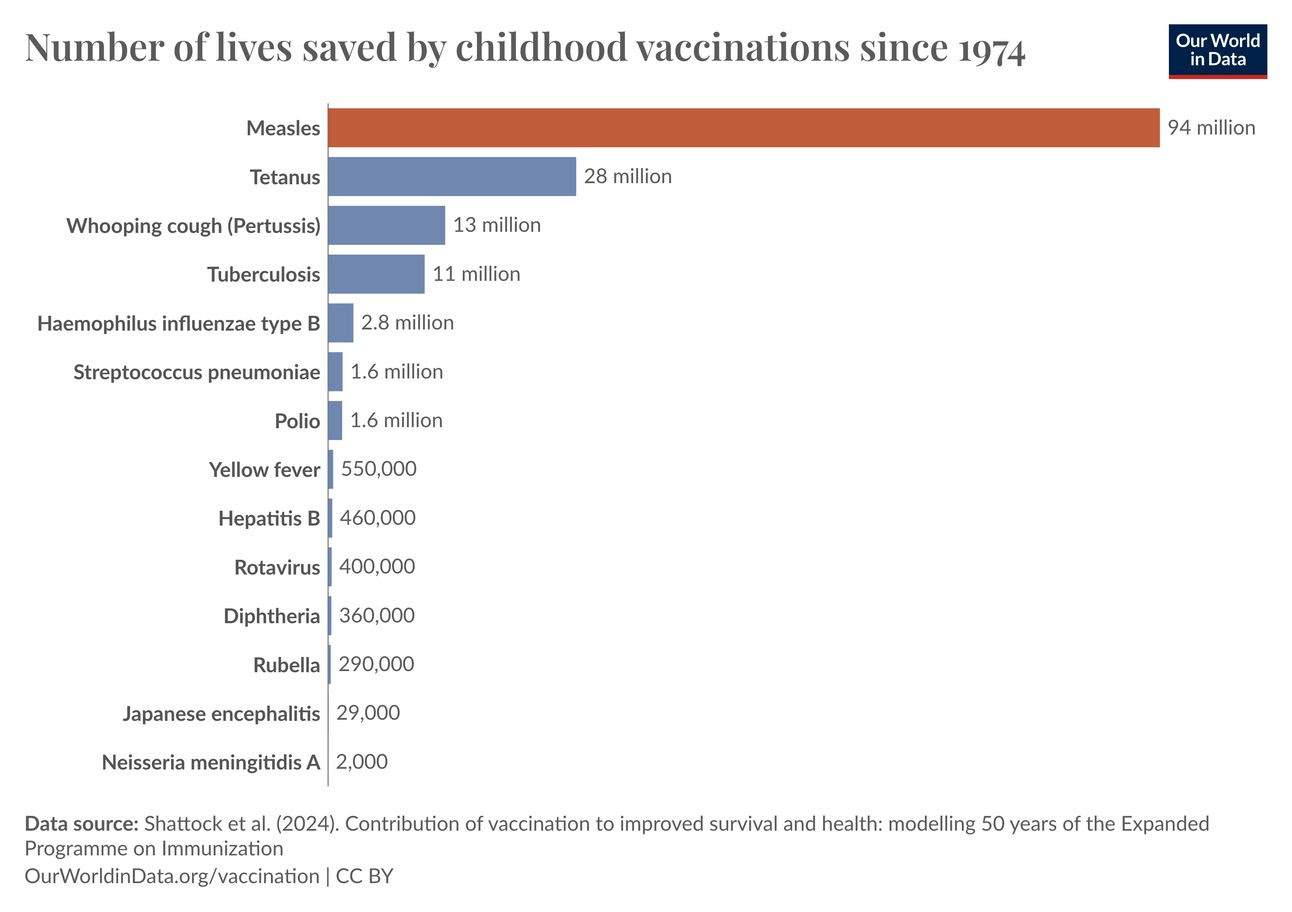
Lack of Faith
The problem isn’t just about science or vaccines. It’s about a breakdown of trust in institutions across the board. And why shouldn’t we be skeptical? Big businesses spend millions lobbying to influence our government, and it often works. It’s naive to think otherwise.
Growing up around Chicago, we have plenty of distrust and plenty of corrupt politicians. Yet maybe we were more honest and upfront about our corruption. And let’s be real, Illinois probably isn’t that unique. America talks a big game about individual responsibility, but we don’t equip people to navigate a system where politicians and scammers are constantly trying to take advantage.
It’s easy to dismiss those who fall prey to misinformation as stupid or uneducated. We all fall for it sometimes. And the truth is, they’ve likely been failed by a system that doesn’t prioritize critical thinking or media literacy. They’re missing crucial information.
Whether this is caused intentionally or not, you’ll have to put your tinfoil hat on and research for yourself.
Further Reading
- Factfulness by Hans Rosling is a great book about updating your knowledge, questioning your beliefs, and global health.
- Clear Thinking by Shane Parrish, a recent five-star read.
- Matthew Facciani’s Wonderful Newsletter about Misinformation
- Also, check out his upcoming book Misguided
